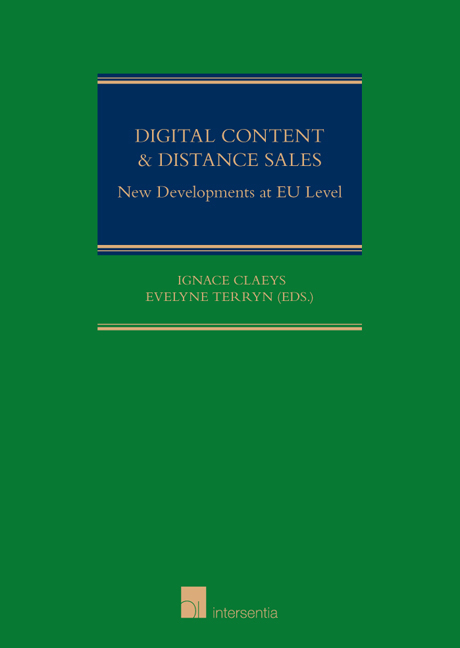Book contents
- Frontmatter
- Preface
- Contents
- List of Authors
- Part I Introduction
- Part II Proposals for a Directive on Online and Distance Sales of Tangible Goods and for a Directive on Digital Content
- Part III Proposal for a Regulation on Cross-Border Portability of Online Content Services in the Internal Market
- ‘Content-Wherever-You-Go’: Towards Cross-Border Portability of Online Digital Content
- PART IV CONCLUSION
‘Content-Wherever-You-Go’: Towards Cross-Border Portability of Online Digital Content
from Part III - Proposal for a Regulation on Cross-Border Portability of Online Content Services in the Internal Market
Published online by Cambridge University Press: 21 September 2018
- Frontmatter
- Preface
- Contents
- List of Authors
- Part I Introduction
- Part II Proposals for a Directive on Online and Distance Sales of Tangible Goods and for a Directive on Digital Content
- Part III Proposal for a Regulation on Cross-Border Portability of Online Content Services in the Internal Market
- ‘Content-Wherever-You-Go’: Towards Cross-Border Portability of Online Digital Content
- PART IV CONCLUSION
Summary
INTRODUCTION
Almost half of European Internet users access content, such as music, movies, video and games, online. Consumers can either purchase or rent such content or subscribe to services to have access to a provider‘s content catalogue. According to a 2015 Eurobarometer survey, two in ten Internet users pay a subscription to access online digital content. Having bought such content, however, does not necessarily mean that consumers can also access the content that they have acquired the right to use in all EU Member States. A Belgian consumer who has a Telenet subscription, for instance, will not be able to use the Yelo TV app when travelling to another Member State. Yet, 33 per cent of those European Internet users who do not currently have a paid subscription (for audiovisual content, music, e-books or video games) state that if they took out such a service in the future it would be important for them to be able to access it when in another Member State. In order to remove the barriers that hamper access and use of such online content services across borders, the European Commission issued a proposal for a Regulation on ensuring the cross-border portability of online content services in the internal market (POCSR) on 9 December 2015.
BACKGROUND
In its Digital Single Market Strategy for Europe, published in May 2015, the European Commission introduced the three pillars on which the Digital Single Market should be built: (1) better access for consumers and businesses to online goods and services across Europe, (2) creating the right conditions for digital networks and services to flourish, and (3) maximising the growth potential of the European Digital Economy. Under the first pillar, better access to digital content and a modern, more European copyright framework was put forward as one of the priorities. It is within this priority that the portability of legally acquired content was indicated as one of the areas in which a legislative proposal would be draft ed. However, prior to the adoption of the Digital Single Market Strategy, the issue of content portability had already been addressed in the Commission‘s 2012 Communication on Content in the Digital Single Market and in the Public Consultation on the Review of the EU Copyright Rules.
- Type
- Chapter
- Information
- Digital Content and Distance SalesNew Developments at EU Level, pp. 283 - 304Publisher: IntersentiaPrint publication year: 2017



